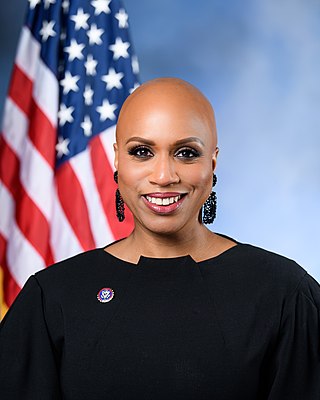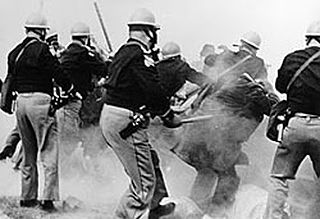
Thomas Miller McClintock II is an American politician serving as the U.S. representative for California's 5th congressional district since 2009. His district stretches from the Sacramento suburbs to the outer suburbs of Fresno; it includes Yosemite National Park. A member of the Republican Party, McClintock served as a California state assemblyman from 1982 to 1992 and from 1996 to 2000, when he became a California state senator, a position he held until 2008. He unsuccessfully ran for governor of California in the 2003 recall election and for lieutenant governor of California in the 2006 election.
False arrest, unlawful arrest or wrongful arrest is a common law tort, where a plaintiff alleges they were held in custody without probable cause, or without an order issued by a court of competent jurisdiction. Although it is possible to sue law enforcement officials for false arrest, the usual defendants in such cases are private security firms.

The Enforcement Act of 1871, also known as the Ku Klux Klan Act, Third Enforcement Act, Third Ku Klux Klan Act, Civil Rights Act of 1871, or Force Act of 1871, is an Act of the United States Congress that was intended to combat the paramilitary vigilantism of the Ku Klux Klan. The act made certain acts committed by private persons federal offenses including conspiring to deprive citizens of their rights to hold office, serve on juries, or enjoy the equal protection of law. The Act authorized the President to deploy federal troops to counter the Klan and to suspend the writ of habeas corpus to make arrests without charge.
In the United States, qualified immunity is a legal principle of federal constitutional law that grants government officials performing discretionary (optional) functions immunity from lawsuits for damages unless the plaintiff shows that the official violated "clearly established statutory or constitutional rights of which a reasonable person would have known". It is comparable to sovereign immunity, though it protects government employees rather than the government itself. It is less strict than absolute immunity, which protects officials who "make reasonable but mistaken judgments about open legal questions", extending to "all [officials] but the plainly incompetent or those who knowingly violate the law". Qualified immunity applies only to government officials in civil litigation, and does not protect the government itself from suits arising from officials' actions.
Pearson v. Callahan, 555 U.S. 223 (2009), was a case decided by the United States Supreme Court dealing with the doctrine of qualified immunity.

The Respect for Marriage Act is a landmark United States federal law passed by the 117th United States Congress in 2022 and signed into law by President Joe Biden. It repeals the Defense of Marriage Act (DOMA), requires the U.S. federal government and all U.S. states and territories to recognize the validity of same-sex and interracial civil marriages in the United States, and protects religious liberty. Its first version in 2009 was supported by former Republican U.S. Representative Bob Barr, the original sponsor of DOMA, and former President Bill Clinton, who signed DOMA in 1996. Iterations of the proposal were put forth in the 111th, 112th, 113th, 114th, and 117th Congresses.

Ayanna Soyini Pressley is an American politician who has served as the U.S. representative for Massachusetts's 7th congressional district since 2019. This district includes the northern three quarters of Boston, most of Cambridge, parts of Milton, as well as all of Chelsea, Everett, Randolph, and Somerville. Before serving in the United States House of Representatives, Pressley served as an at-large member of the Boston City Council from 2010 through 2019. She was elected to the United States House of Representatives in 2018 after she defeated the ten-term incumbent Mike Capuano in the Democratic primary election for Massachusetts's 7th congressional district and ran unopposed in the general election. Pressley was the first black woman elected to the Boston City Council and the first black woman elected to Congress from Massachusetts. Pressley is a member of "The Squad", a group of progressive Congress members.

Police brutality is the use of excessive or unnecessary force by personnel affiliated with law enforcement duties when dealing with suspects and civilians.

Justin A. Amash is an American lawyer and politician who served as the U.S. representative for Michigan's 3rd congressional district from 2011 to 2021. He was the second Palestinian-American member of Congress. Originally a Republican, Amash left the GOP and became an independent on July 4, 2019. In April 2020, he joined the Libertarian Party, leaving Congress in January 2021 as the only Libertarian to serve in Congress.

Carlton Wayne Reeves is a United States district judge of the United States District Court for the Southern District of Mississippi and chair of the United States Sentencing Commission.

The No Oil Producing and Exporting Cartels Act (NOPEC) was a U.S. Congressional bill, never enacted, known as H.R. 2264 (in 2007) and then as part of H.R. 6074 (in 2008). NOPEC was designed to remove the state immunity shield and to allow the international oil cartel, OPEC, and its national oil companies to be sued under U.S. antitrust law for anti-competitive attempts to limit the world's supply of petroleum and the consequent impact on oil prices. Despite popular sentiment against OPEC, legislative proposals to limit the organization's sovereign immunity have so far been unsuccessful. "Varied forms of a NOPEC bill have been introduced some 16 times since 2000, only to be vehemently resisted by the oil industry and its allied oil interests like the American Petroleum Institute and their legion of 'K' Street Lobbyists."

The Therapeutic Fraud Prevention Act is a bill in the United States House of Representatives that if passed would prohibit, as an unfair and deceptive act or practice, commercial sexual orientation and gender identity conversion therapy, and for other purposes.
The Strengthening the Tenth Amendment Through Entrusting States (STATES) Act was a bill proposed in the 115th United States Congress that would recognize legalization of cannabis and the U.S. state laws that have legalized it through their legislatures or citizen initiative. It was introduced on June 7, 2018, by Senators Cory Gardner and Elizabeth Warren. A companion bill was introduced the same day in the House of Representatives, sponsored by Earl Blumenauer and David Joyce. The act would amend the Controlled Substances Act of 1970 to exempt from federal enforcement individuals or corporations in states who are in compliance with U.S. state, U.S. territory and the District of Columbia, or tribal law on cannabis, with certain additional provisions such as minimum ages. The banking provisions of the STATES Act have been reintroduced as the Secure and Fair Enforcement (SAFE) Banking Act of 2019 in the 116th U.S. Congress by Ed Perlmutter in the House, and by Jeff Merkley in the Senate. As of September 18, 2019, the House bill had 206 cosponsors, and the Senate bill had 33 cosponsors.
Plumhoff v. Rickard, 572 U.S. 765 (2014), is a United States Supreme Court case involving the use of force by police officers during high-speed car chases. After first holding that it had jurisdiction to hear the case, the Court held that the conduct of the police officers involved in the case did not violate the Fourth Amendment to the U.S. Constitution, which prohibits unreasonable searches and seizures.
Pierson v. Ray, 386 U.S. 547 (1967), was a United States Supreme Court case in which the Court first introduced the justification for qualified immunity for police officers from being sued for civil rights violations under Section 1983, by arguing that "[a] policeman's lot is not so unhappy that he must choose between being charged with dereliction of duty if he does not arrest when he had probable cause, and being mulcted in damages if he does."

The George Floyd Justice in Policing Act of 2021 was a policing reform bill drafted by Democrats in the United States Congress. The legislation was introduced in the United States House of Representatives on February 24, 2021. The legislation aims to combat police misconduct, excessive force, and racial bias in policing.
The BREATHE Act is a proposal for a federal omnibus bill, presented by the Electoral Justice Project of the Movement for Black Lives. The bill proposes to divest taxpayer dollars from policing and invest in alternate, community-based approaches to public safety.

The John R. Lewis Voting Rights Advancement Act of 2023 is proposed voting rights legislation named after civil rights activist John Lewis. The bill would restore and strengthen parts of the Voting Rights Act of 1965, most notably its requirement for certain jurisdictions to seek federal approval before enacting certain changes to their voting laws. The bill was written in response to the Supreme Court decision in Shelby County v. Holder in 2013, which struck down the system that was used to determine which jurisdictions were subject to that requirement.

The Creating a Respectful and Open World for Natural Hair Act of 2022 was a bill in the United States Congress intended to prohibit discrimination based on an individual's hair texture or hairstyle by classifying such discrimination illegal under federal law. It applied to federally assisted programs, housing programs, public accommodations, and employment. The act was introduced in the House of Representatives by Congresswoman Bonnie Watson Coleman (D-NJ) on March 19, 2021. Senator Cory Booker (D-NJ) introduced a companion bill in the Senate on March 22, 2021. The CROWN Act of 2022 marked the second time the legislation was introduced in Congress.







